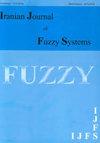基于自适应粒子群优化的模糊聚类算法在非线性系统建模和辨识中的应用
IF 1.2
4区 数学
Q1 MATHEMATICS
引用次数: 2
摘要
本文提出了一种基于改进自适应粒子群优化的改进的Type2-PCM聚类算法Type2-PCM- iapso。首先,提出了一种新的聚类算法Type2-PCM。Type2-PCM算法可以解决模糊c均值算法(FCM)、Gustafson-Kessel算法(G-K)、可能性c均值算法(PCM)和NPCM算法(对噪声或异常点的灵敏度和局部最小灵敏度)遇到的问题。等。其次,将Type2-PCM算法与改进的自适应粒子群优化算法(IAPSO)相结合,保证算法收敛到目标函数的局部最小值;在不同方程描述的系统、Box-Jenkins煤气炉、干燥机系统和对流系统上,验证了Type2-PCM和Type2-PCM- iapso算法的有效性。所使用的验证测试表明,这些算法具有良好的性能。然而,他们的均方误差检验(MSE)显示,与FCM、G-K、PCM、FCM- pso、Type2-PCM-PSO、RKPFCM和RKPFCM- pso算法相比,Type2-PCM-IAPSO算法的性能更好。本文章由计算机程序翻译,如有差异,请以英文原文为准。
(2004-5811) Improved fuzzy clustering algorithm using adaptive particle swarm optimization for nonlinear system modeling and identification
In this paper, an improved Type2-PCM clustering algorithm based on improved adaptive particle swarm optimization called Type2-PCM-IAPSO is proposed. Firstly, a new clustering algorithm called Type2-PCM is proposed. The Type2-PCM algorithm can solve the problems encountered by fuzzy c-means algorithm (FCM), Gustafson-Kessel algorithm (G-K), possibilistic c-means algorithm (PCM) and NPCM (sensitivity to noise or aberrant points and local minimal sensitivity). . . etc. Secondly, we combined our Type2-PCM algorithm with the improved adaptive particle swarm optimization algorithm (IAPSO) to ensure proper convergence to a local minimum of the objective function. The effectiveness of the two proposed algorithms Type2-PCM and Type2-PCM-IAPSO was tested on a system described by a different equation, Box-Jenkins gas furnace, dryer system and the convection system. The validation tests used showed good performance of these algorithms. However, their average square error test (MSE) shows a better behaviour of the Type2-PCM-IAPSO algorithm compared to the FCM, G-K, PCM, FCM-PSO, Type2-PCM-PSO, RKPFCM and RKPFCM-PSO algorithms.
求助全文
通过发布文献求助,成功后即可免费获取论文全文。
去求助
来源期刊
CiteScore
3.50
自引率
16.70%
发文量
0
期刊介绍:
The two-monthly Iranian Journal of Fuzzy Systems (IJFS) aims to provide an international forum for refereed original research works in the theory and applications of fuzzy sets and systems in the areas of foundations, pure mathematics, artificial intelligence, control, robotics, data analysis, data mining, decision making, finance and management, information systems, operations research, pattern recognition and image processing, soft computing and uncertainty modeling.
Manuscripts submitted to the IJFS must be original unpublished work and should not be in consideration for publication elsewhere.

 求助内容:
求助内容: 应助结果提醒方式:
应助结果提醒方式:


